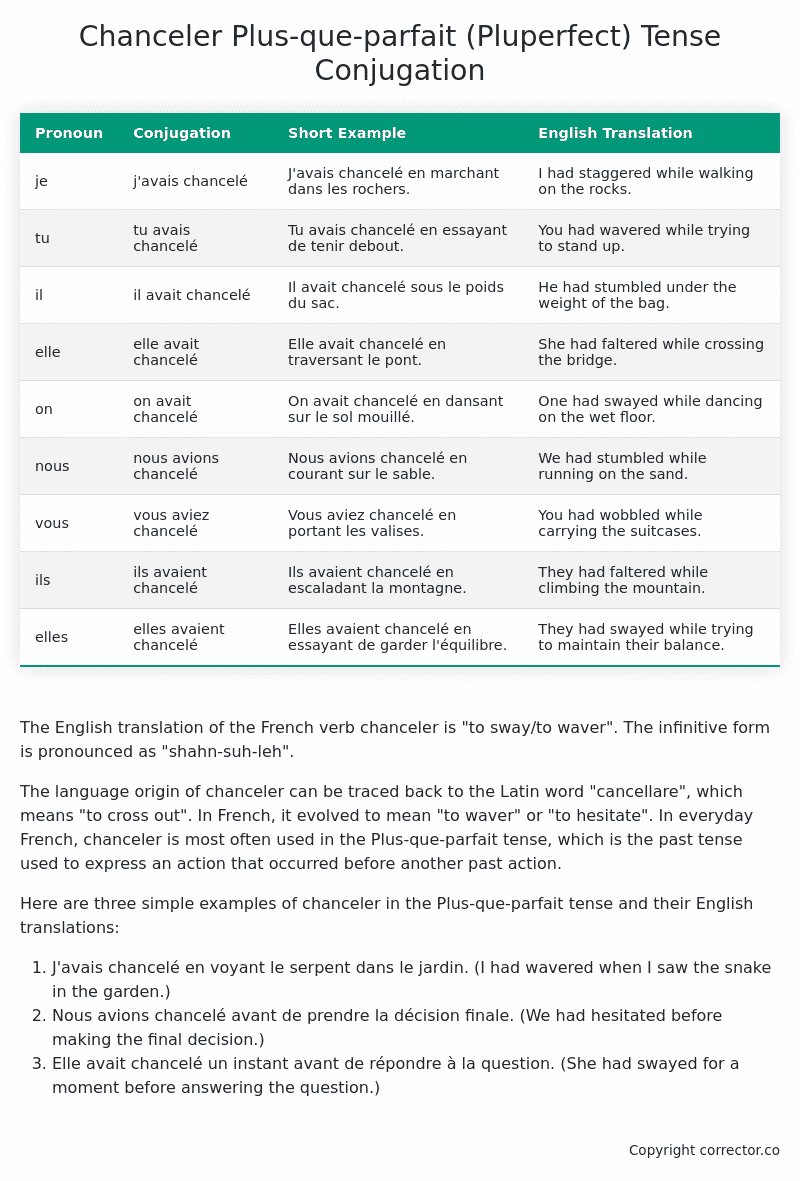Plus-que-parfait (Pluperfect) Tense Conjugation of the French Verb chanceler
Introduction to the verb chanceler
The English translation of the French verb chanceler is “to sway/to waver”. The infinitive form is pronounced as “shahn-suh-leh”.
The language origin of chanceler can be traced back to the Latin word “cancellare”, which means “to cross out”. In French, it evolved to mean “to waver” or “to hesitate”. In everyday French, chanceler is most often used in the Plus-que-parfait tense, which is the past tense used to express an action that occurred before another past action.
Here are three simple examples of chanceler in the Plus-que-parfait tense and their English translations:
- J’avais chancelé en voyant le serpent dans le jardin. (I had wavered when I saw the snake in the garden.)
- Nous avions chancelé avant de prendre la décision finale. (We had hesitated before making the final decision.)
- Elle avait chancelé un instant avant de répondre à la question. (She had swayed for a moment before answering the question.)
Table of the Plus-que-parfait (Pluperfect) Tense Conjugation of chanceler
| Pronoun | Conjugation | Short Example | English Translation |
|---|---|---|---|
| je | j’avais chancelé | J’avais chancelé en marchant dans les rochers. | I had staggered while walking on the rocks. |
| tu | tu avais chancelé | Tu avais chancelé en essayant de tenir debout. | You had wavered while trying to stand up. |
| il | il avait chancelé | Il avait chancelé sous le poids du sac. | He had stumbled under the weight of the bag. |
| elle | elle avait chancelé | Elle avait chancelé en traversant le pont. | She had faltered while crossing the bridge. |
| on | on avait chancelé | On avait chancelé en dansant sur le sol mouillé. | One had swayed while dancing on the wet floor. |
| nous | nous avions chancelé | Nous avions chancelé en courant sur le sable. | We had stumbled while running on the sand. |
| vous | vous aviez chancelé | Vous aviez chancelé en portant les valises. | You had wobbled while carrying the suitcases. |
| ils | ils avaient chancelé | Ils avaient chancelé en escaladant la montagne. | They had faltered while climbing the mountain. |
| elles | elles avaient chancelé | Elles avaient chancelé en essayant de garder l’équilibre. | They had swayed while trying to maintain their balance. |
Other Conjugations for Chanceler.
Le Present (Present Tense) Conjugation of the French Verb chanceler
Imparfait (Imperfect) Tense Conjugation of the French Verb chanceler
Passé Simple (Simple Past) Tense Conjugation of the French Verb chanceler
Passé Composé (Present Perfect) Tense Conjugation of the French Verb chanceler
Futur Simple (Simple Future) Tense Conjugation of the French Verb chanceler
Futur Proche (Near Future) Tense Conjugation of the French Verb chanceler
Plus-que-parfait (Pluperfect) Tense Conjugation of the French Verb chanceler (this article)
Passé Antérieur (Past Anterior) Tense Conjugation of the French Verb chanceler
Futur Antérieur (Future Anterior) Tense Conjugation of the French Verb chanceler
Subjonctif Présent (Subjunctive Present) Tense Conjugation of the French Verb chanceler
Subjonctif Passé (Subjunctive Past) Tense Conjugation of the French Verb chanceler
Subjonctif Imparfait (Subjunctive Imperfect) Tense Conjugation of the French Verb chanceler
Subjonctif Plus-que-parfait (Subjunctive Pluperfect) Tense Conjugation of the French Verb chanceler
Conditionnel Présent (Conditional Present) Tense Conjugation of the French Verb chanceler
Conditionnel Passé (Conditional Past) Tense Conjugation of the French Verb chanceler
L’impératif Présent (Imperative Present) Tense Conjugation of the French Verb chanceler
L’infinitif Présent (Infinitive Present) Tense Conjugation of the French Verb chanceler
Struggling with French verbs or the language in general? Why not use our free French Grammar Checker – no registration required!
Get a FREE Download Study Sheet of this Conjugation 🔥
Simply right click the image below, click “save image” and get your free reference for the chanceler Plus-que-parfait tense conjugation!

Chanceler – About the French Plus-que-parfait (Pluperfect) Tense
Tense Formation
Common everyday usage patterns
Sequencing of past events
Background information
Hypothetical or reported speech
Interactions with other tenses
Summary
I hope you enjoyed this article on the verb chanceler. Still in a learning mood? Check out another TOTALLY random French verb conjugation!


